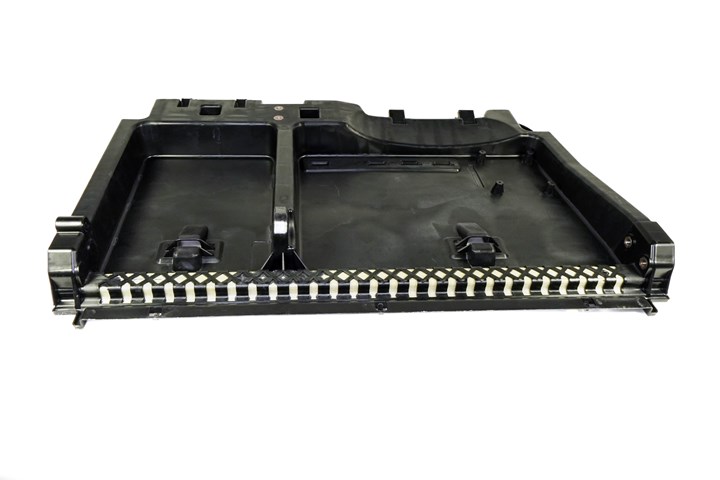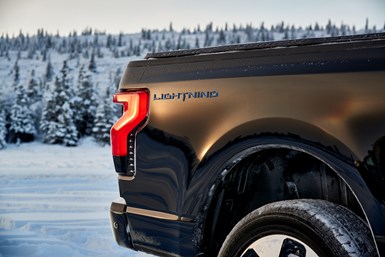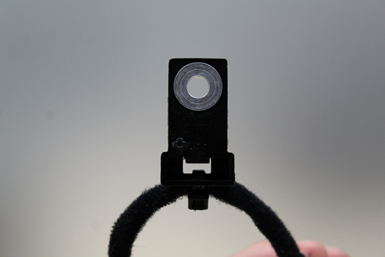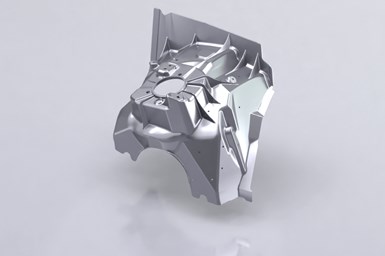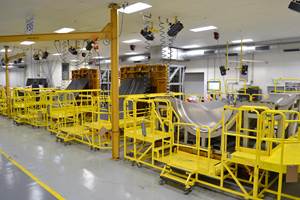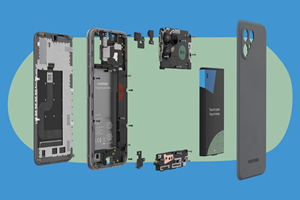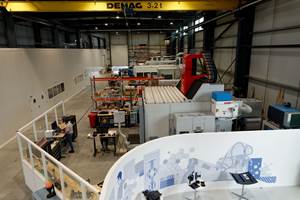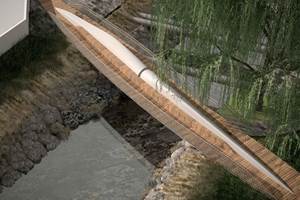Altair announces winners of 10th annual Enlighten Award
Ford, Shiloh Industries, General Motors, Toyota, BASF, L&L Products, Nemak and McMaster University are among some of the winners creating a more sustainable, lightweight future.
BASF Corp. Toyota and L&L Products lightweighted the Toyota Tundra second-row rear seat structure by replacing 60+ stamped, welded steel pieces with only four composite ones. Photo Credit, all images: Altair
Altair Engineering (Troy, Mich., U.S.) has named the winners of the 10th annual Altair Enlighten Award. Presented in association with the Center for Automotive Research (CAR, Ann Arbor, Mich., U.S.), the award honors sustainability and lightweighting advancements in the automotive industry that successfully reduce carbon footprint, mitigate water and energy consumption, and leverage material reuse and recycling efforts.
“The caliber of nominees for this year’s Enlighten Award was unparalleled and is a true testament to the investments the automotive industry is making to reach — and even exceed — global sustainability targets,” Richard Yen, senior vice president, product and strategy, Altair, says. “As we celebrate our tenth year and have evaluated hundreds of worthy entries over the years, we have seen this award evolve from showcasing vehicle lightweighting initiatives to companies now fully embracing sustainability and the commitment to building a net-zero environment and circular economy.”
Take a look at 2021’s Altair Enlighten Award winners.
The complete list of all winning organizations, runners-up and honorable mentions are are follows:
Sustainable Product –Winner: Ford Motor Co. (Dearborn, Mich., U.S.) – 2022 F-150 Lightning
The 2022 Ford F-150 Lightning with an extended range battery delivers up to 580 horsepower and 775 pound-feet of torque — said to be the most torque of any F-150 ever — as well as a high-tech front trunk and the ability to power one’s your home, if needed. The F-150 Lightning is powered by dual in-board motors with up to 320 miles of range on select models and is built on an all-new steel frame that supports a maximum 2,235-pound payload and up to 10,000 pounds of towing capacity.
Sustainable Product – Runner-up: Lacks Enterprises (Grand Rapids, Mich., U.S.) – Composite Wheel Technology
Lack Enterprises’ weight-saving composite wheel technology is recognized in a joint Environmental Protection Agency (EPA) and the National Highway Traffic Safety Administration (NHTSA) report titled “Midterm Evaluation of Light-Duty Vehicle Greenhouse Gas Emission Standards and Corporate Average Fuel Economy (CAFE) standards for Model Years 2022-2025.” The patented wheel design enables multiple finishes and designs on the same wheel backbone offering increased trim level differentiation, while saving costs and optimizing aerodynamics and fuel efficiency.
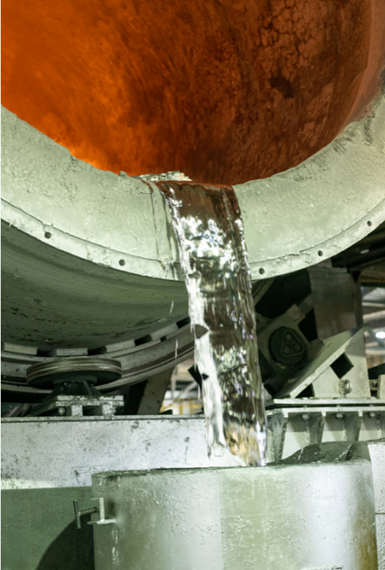
Nemak Melting Center.
Sustainable Process – Winner: Nemak (Monterrey, Mexico) – Recycled Materials for Sustainable Manufacturing and Product
Nemak’s Melting Center specializes in the production of aluminum-silicon alloys for the automotive industry. Recycling 2.5 billion aluminum cans per year, Nemak says it contributes to a more sustainable manufacturing. With a recycling capacity of more than 400,000 tons per year, the process decreases the amount of energy needed to extract primary aluminum by 95%, thus eliminating 4.8 million tons of carbon dioxide per year.
Sustainable Process – Runner-up: ArcelorMittal (Luxembourg) – First Industrial Large-Scale Hydrogen Direct Reduced Iron Test (H2 DRI Test)
ArcelorMittal has launched what is says is the first large-scale green trial of hydrogen-based injection in a direct reduced iron (DRI) plant. Through a $10 billion investment plan, this milestone will propel the future large-scale supply of green steel to automotive original equipment manufacturers.
Sustainable Material – Winner: Ford Motor Co. – 100% Post-Consumer Recycled (PCR) Ocean Plastic (PA6) Wiring Harness Clips
Ford has implemented an industry-first application of 100% post-consumer recycled (PCR) ocean plastic into vehicle parts. The material composition of these parts is collected by workers from plastic waste in the Indian Ocean and the Arabian Sea, promoting healthier marine life, reducing landfill waste and energy use and providing jobs.
Sustainable Material – Runner-up: Nucor Corp. (Charlotte, N.C., U.S.) – Econiq, the World’s First Net-Zero Carbon Steel at Scale
Said to be the world’s first net-zero steel produced at scale, Nucor is pioneering the reduction of a vehicle’s carbon footprint without changing the design or grade selection. Econiq is available to all automotive companies today, has a very high percentage of recycled content and is the only net-zero steel produced at scale in North America, according to the company.
Enabling Technology – Winner: Shiloh Industries (Valley City, Ohio, U.S.), General Motors (Detroit, Mich., U.S.) – ShilohCore Acoustic Patch Laminate (APL)
Its noise, vibration and harshness (NVH) damping performance functions comparably to a fully laminated vehicle material, but lowers weight, carbon emissions and costs. Patented ShilohCore NVH damping performance can be tailored to achieve required temperature ranges and target frequencies, while maintaining vehicle fuel efficiency and reducing raw material usage.
Enabling Technology – Runner-up: Bionic Mesh Design GmbH (Süßen, Germany) – Bionic Mesh Design
Bionic Mesh Design GmbH says it has refined and redefined lightweight design for mass casting and forging productions. These lightweight designs are achieved through the direct transformation of topology in CAD models and an emphasis on production processes. By requiring 90% less design time than standard solid modeling processes, Bionic Mesh Design helps automotive OEMs and suppliers get products to market faster.
Enabling Technology – Runner-up: Human Horizons (Shanghai, China) – Integrated High-Pressure Die Casting (HPDC) Rear Cabin
Human Horizons has incorporated high-pressure die casting and heat-free treatment material into the manufacturing of its rear cabin, resulting in up to 20% weight reduction. The HPDC Rear Cabin has integrated 40 parts of the rear floor into a single part, thereby cutting manufacturing and mold development time by a third.
Future of Lightweighting – Winner: McMaster University (Ontario, Canada) and Nemak – NemAlloy, Novel Lightweight Automotive Aluminum Alloys
A new, high-strength aluminum die-casting alloy that serves the needs of automotive structural components without requiring heat treatment. Due to its lightweighting advantages and heat treatment elimination, Nemalloy is a fully recyclable solution that can help companies transform the way they manufacture and forge a path to net-zero emissions, according to the partners.
Future of Lightweighting – Runner-up: Adient (Ireland, and Plymouth, Mich., U.S.) – UltraThin Seating
Adient has constructed ultra-thin, reinforced automotive seats made of comfortable, thermoplastic elastomers panels. UltraThin’s design not only saves space and mass, but it also saves labor, time spent in assembly and materials and part count.
Future of Lightweighting – Runner-up: Yanfeng (Shanghai, China) – Instrument Panel and Passenger Air Bag (IP PAB) Integration
The IP PAB integration combines the chute and airbag module housing into one part to lower costs and creates synergies in the development process. Through material substitution and weight savings by 23%, the system reduces the product’s carbon footprint by 50%.
Future of Lightweighting – Honorable mention: AMC, csi entwicklungstechnik (Neckarsulm, Germany), DITF (Denkendorf, Germany), BMW M (Munich, Germany) – NaMiKo Biobased Automotive Center Console
With the goal of a lightweighting and zero-footprint product, the NaMiKo-Project team combined sustainability, methodical lifecycle analysis and lightweight design to develop an automotive center console using the “NFK in 3D” filament winding process covered with circular “smart textiles” and bio-based natural fiber composites.
Module Lightweighting – Winner: BASF Corp. (Florham Park, N.J., U.S.), Toyota (Toyota, Japan) and L&L Products (Romeo, Mich., U.S.) – Toyota Tundra Second Row Seat Structure
By replacing more than 60 stamped and welded steel pieces with only four composite pieces in the seat assembly, the Toyota Tundra reportedly lightweights its second-row rear seat structure exponentially. These changes in production have resulted in 20% mass reductions over previous generations’ steel seat structure and achieved 20% cost savings over previous generations’ steel seat structure.
Module Lightweighting – Runner-up: Bocar Group (Tlalpan, Mexico) – Toyota Tundra Rear End Post
The Bocar lightweight design of the Toyota Tundra rear end post is reported to be the first of its kind visual class “A” exterior structural die-cast application. It achieves a more sustainable mobility by saving 4.4 kilograms in vehicle mass and 78.9 kilograms in CO2 emissions per vehicle per year.
Media partners for the 2022 Altair Enlighten Award include SAE, Automotive Engineering, Tech Briefs and Automobil Industrie.
Related Content
Plant tour: Middle River Aerostructure Systems, Baltimore, Md., U.S.
The historic Martin Aircraft factory is advancing digitized automation for more sustainable production of composite aerostructures.
Read MoreComposites end markets: Electronics (2024)
Increasingly, prototype and production-ready smart devices featuring thermoplastic composite cases and other components provide lightweight, optimized sustainable alternatives to metal.
Read MorePlant tour: Daher Shap’in TechCenter and composites production plant, Saint-Aignan-de-Grandlieu, France
Co-located R&D and production advance OOA thermosets, thermoplastics, welding, recycling and digital technologies for faster processing and certification of lighter, more sustainable composites.
Read MoreRecycling end-of-life composite parts: New methods, markets
From infrastructure solutions to consumer products, Polish recycler Anmet and Netherlands-based researchers are developing new methods for repurposing wind turbine blades and other composite parts.
Read MoreRead Next
VIDEO: High-volume processing for fiberglass components
Cannon Ergos, a company specializing in high-ton presses and equipment for composites fabrication and plastics processing, displayed automotive and industrial components at CAMX 2024.
Read MoreAll-recycled, needle-punched nonwoven CFRP slashes carbon footprint of Formula 2 seat
Dallara and Tenowo collaborate to produce a race-ready Formula 2 seat using recycled carbon fiber, reducing CO2 emissions by 97.5% compared to virgin materials.
Read More“Structured air” TPS safeguards composite structures
Powered by an 85% air/15% pure polyimide aerogel, Blueshift’s novel material system protects structures during transient thermal events from -200°C to beyond 2400°C for rockets, battery boxes and more.
Read More




